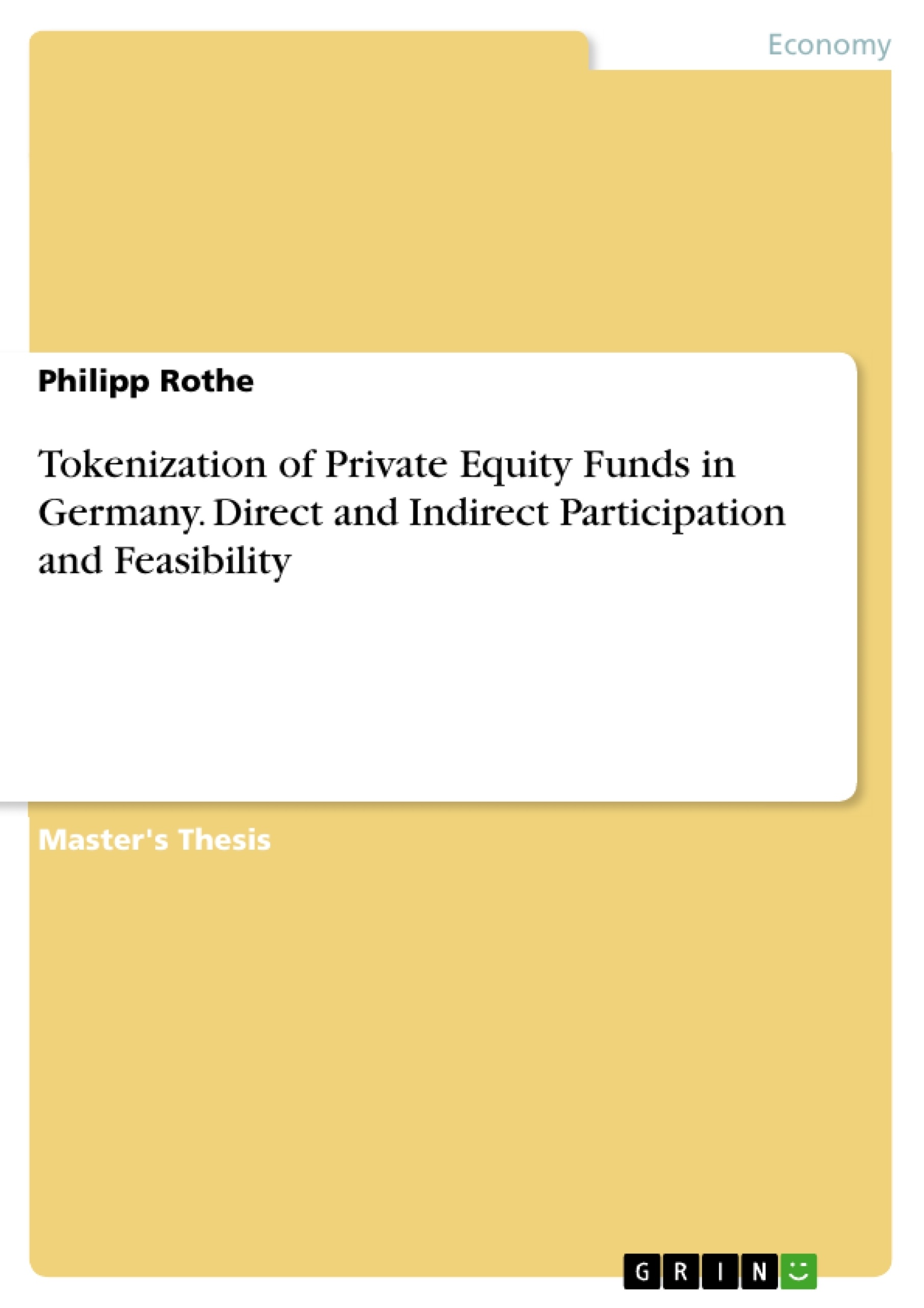The aim of the master thesis is to examine whether private equity is suitable for tokenization. After analyzing different characteristics of private equity, such as the illiquidity or mechanisms like capital calls, the master thesis concluded that the asset class is suitable. Private equity shares in the form of security tokens can help to reduce illiquidity and cashflows like the capital calls can be automated by the use of smart contracts.
For the tokenization, the master thesis recommends to use existing standards, such as the Ethereum blockchain or the ERC-1400 token. Furthermore, different structures for issuing private equity tokens were elaborated. These include a structure for an indirect participation via a special purpose vehicle which issues tokens and simultaneously invests into a fund, but also a direct participation where the fund itself can issue tokens. During the description of possible structures, all relevant laws were included. These include the German Electronic Securities Act (eWpG), German Banking Act (KWG), Security Prospectus Act (WpPG), Capital Investment Act (VermAnlG), Securities Trading Act (WpHG) and the German Investment Code (KAGB).
All structures were evaluated from the perspective of private equity funds, institutional investors, private investors or other relevant intermediaries. Also, benefits and challenges for the different structures and participants were discussed. The benefits include an increase in efficiency of several processes, potential cost savings, the possibility for funds to reach more investors or the possibility for investors to diversify their portfolio more. Still, these benefits could only be made use of, if major challenges are mastered by the market participants. These include an insufficient legal framework, different hurdles when implementing a secondary market, or the problem that theoretical approaches might work differently in reality.
Inhaltsverzeichnis (Table of Contents)
- Introduction
- Motivation and objective of the thesis
- Research questions
- Structure of the thesis
- Core concepts of tokenization in Germany
- Digital ownership
- Distributed Ledger Technology and Blockchain Technology
- Crypto tokens and security tokens
- Legal matters of security tokens
- Core concepts of Private Equity in Germany
- Characteristics of Private Equity
- Legal matters in Private Equity
- Development of the German Private Equity market
- Approach for tokenization of Private Equity Funds
- Indirect participation in Private Equity with tokenized products
- Legal structure
- Involved parties and mechanisms
- Direct participation in Private Equity with tokenized products
- Legal structure
- Involved parties and mechanisms
- Considerations for tokenization of equity products
- Secondary market
- Further considerations
- Feasibility of tokenization in Germany
- Added value through tokenizing Private Equity
- Challenges of tokenization of Private Equity
- Effects of tokenization to the Modern Portfolio Theory
Zielsetzung und Themenschwerpunkte (Objectives and Key Themes)
This master thesis examines the tokenization of private equity funds in Germany, exploring the potential of blockchain technology to transform this asset class. The work focuses on developing and analyzing different structures for realizing tokenization, encompassing both direct and indirect participation in private equity funds. The thesis considers the current German legal framework and its implications for different market participants, including private equity funds, institutional investors, private investors, and intermediaries.
- The potential of blockchain technology for digitizing the financial sector and, specifically, private equity.
- The legal framework surrounding tokenization of private equity funds in Germany.
- The development and analysis of various structures for implementing tokenization, including both direct and indirect participation in private equity funds.
- The benefits and challenges associated with tokenization for different market participants.
- The impact of tokenized private equity funds on portfolio management according to the modern portfolio theory.
Zusammenfassung der Kapitel (Chapter Summaries)
- Introduction: The thesis begins by outlining the motivation and objective of the study, highlighting the importance of digital transformation and blockchain technology in the financial sector. It introduces the concept of tokenization and its potential for private equity, examining the asset class's unique characteristics and the challenges associated with its traditional structure.
- Core concepts of tokenization: This chapter provides an overview of tokenization, exploring the concepts of digital ownership, distributed ledger technology, and blockchain technology. It delves into the distinctions between crypto tokens and security tokens and discusses the legal framework surrounding security tokens in Germany.
- Core concepts of Private Equity: This chapter provides a comprehensive overview of private equity in Germany, focusing on its characteristics, including illiquidity and capital calls. It also examines the legal aspects of private equity, including relevant laws and regulations.
- Development of the German Private Equity market: This chapter offers an analysis of the evolution of the German private equity market, exploring its size, structure, and investment trends. It examines the role of private equity funds and their relationships with investors.
- Approach for tokenization of Private Equity Funds: This chapter dives into the core of the thesis, presenting various structures for tokenizing private equity funds. It explores both indirect participation through special purpose vehicles and direct participation where the fund itself issues tokens. Each structure is analyzed from the perspective of relevant parties, including funds, investors, and intermediaries.
Schlüsselwörter (Keywords)
The master thesis delves into the potential of tokenization to transform the private equity landscape in Germany. Key terms include: tokenization, blockchain technology, private equity, security tokens, digital assets, legal framework, German financial regulations, investment structures, portfolio management, Modern Portfolio Theory.
- Quote paper
- Philipp Rothe (Author), 2023, Tokenization of Private Equity Funds in Germany. Direct and Indirect Participation and Feasibility, Munich, GRIN Verlag, https://www.grin.com/document/1357319




